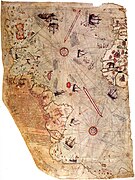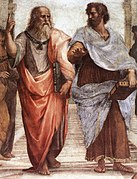Portal:History of science
The History of Science Portal
The history of science covers the development of science from ancient times to the present. It encompasses all three major branches of science: natural, social, and formal. Protoscience, early sciences, and natural philosophies such as alchemy and astrology during the Bronze Age, Iron Age, classical antiquity, and the Middle Ages declined during the early modern period after the establishment of formal disciplines of science in the Age of Enlightenment.
Science's earliest roots can be traced to Ancient Egypt and Mesopotamia around 3000 to 1200 BCE. These civilizations' contributions to mathematics, astronomy, and medicine influenced later Greek natural philosophy of classical antiquity, wherein formal attempts were made to provide explanations of events in the physical world based on natural causes. After the fall of the Western Roman Empire, knowledge of Greek conceptions of the world deteriorated in Latin-speaking Western Europe during the early centuries (400 to 1000 CE) of the Middle Ages, but continued to thrive in the Greek-speaking Byzantine Empire. Aided by translations of Greek texts, the Hellenistic worldview was preserved and absorbed into the Arabic-speaking Muslim world during the Islamic Golden Age. The recovery and assimilation of Greek works and Islamic inquiries into Western Europe from the 10th to 13th century revived the learning of natural philosophy in the West. Traditions of early science were also developed in ancient India and separately in ancient China, the Chinese model having influenced Vietnam, Korea and Japan before Western exploration. Among the Pre-Columbian peoples of Mesoamerica, the Zapotec civilization established their first known traditions of astronomy and mathematics for producing calendars, followed by other civilizations such as the Maya.
Natural philosophy was transformed during the Scientific Revolution in 16th- to 17th-century Europe, as new ideas and discoveries departed from previous Greek conceptions and traditions. The New Science that emerged was more mechanistic in its worldview, more integrated with mathematics, and more reliable and open as its knowledge was based on a newly defined scientific method. More "revolutions" in subsequent centuries soon followed. The chemical revolution of the 18th century, for instance, introduced new quantitative methods and measurements for chemistry. In the 19th century, new perspectives regarding the conservation of energy, age of Earth, and evolution came into focus. And in the 20th century, new discoveries in genetics and physics laid the foundations for new sub disciplines such as molecular biology and particle physics. Moreover, industrial and military concerns as well as the increasing complexity of new research endeavors ushered in the era of "big science," particularly after World War II. (Full article...)
Selected article -

Physics is a branch of science whose primary objects of study are matter and energy. Discoveries of physics find applications throughout the natural sciences and in technology. Historically, physics emerged from the scientific revolution of the 17th century, grew rapidly in the 19th century, then was transformed by a series of discoveries in the 20th century. Physics today may be divided loosely into classical physics and modern physics.
Many detailed articles on specific topics are available through the Outline of the history of physics. (Full article...)Selected image

This iconographic French tapestry from the early 16th century depicts the muse Astronomia consulting with an astronomer, possibly Ptolemy. The tapestry resides in the Röhsska Konstslöjdmuseet, but its origins are unknown.
Did you know
...that Einstein's famous letter to FDR about the possibility of an atomic bomb was actually written by Leó Szilárd?
...that geology was transformed in the latter part of the 20th century after widespread acceptance of plate tectonics?
...that the idea of biological evolution dates to the ancient world?
Selected Biography -
Albert Einstein (/ˈaɪnstaɪn/ EYEN-styne; German: [ˈalbɛɐt ˈʔaɪnʃtaɪn] ⓘ; 14 March 1879 – 18 April 1955) was a German-born theoretical physicist who is widely held to be one of the greatest and most influential scientists of all time. Best known for developing the theory of relativity, Einstein also made important contributions to quantum mechanics, and was thus a central figure in the revolutionary reshaping of the scientific understanding of nature that modern physics accomplished in the first decades of the twentieth century. His mass–energy equivalence formula E = mc2, which arises from relativity theory, has been called "the world's most famous equation". He received the 1921 Nobel Prize in Physics "for his services to theoretical physics, and especially for his discovery of the law of the photoelectric effect", a pivotal step in the development of quantum theory. His work is also known for its influence on the philosophy of science. In a 1999 poll of 130 leading physicists worldwide by the British journal Physics World, Einstein was ranked the greatest physicist of all time. His intellectual achievements and originality have made the word Einstein broadly synonymous with genius.
Born in the German Empire, Einstein moved to Switzerland in 1895, forsaking his German citizenship (as a subject of the Kingdom of Württemberg) the following year. In 1897, at the age of seventeen, he enrolled in the mathematics and physics teaching diploma program at the Swiss federal polytechnic school in Zürich, graduating in 1900. In 1901, he acquired Swiss citizenship, which he kept for the rest of his life. In 1903, he secured a permanent position at the Swiss Patent Office in Bern. In 1905, he submitted a successful PhD dissertation to the University of Zurich. In 1914, he moved to Berlin in order to join the Prussian Academy of Sciences and the Humboldt University of Berlin. In 1917, he became director of the Kaiser Wilhelm Institute for Physics; he also became a German citizen again, this time as a subject of the Kingdom of Prussia. (Full article...)Selected anniversaries
- 1566 - Death of Luca Ghini, Italian physician and botanist (b. 1490)
- 1677 - Death of Isaac Barrow, English mathematician (b. 1630)
- 1733 - Birth of Jean-Charles de Borda, French mathematician, physicist, political scientist, and sailor (d. 1799)
- 1808 - The Royal Netherlands Academy of Arts and Sciences is founded by Louis Bonaparte.
- 1825 - Birth of Thomas Henry Huxley, English biologist (d. 1895)
- 1972 - The Don't Make A Wave Committee, a fledgling environmental organization founded in Canada in 1971, officially changed its name to "Greenpeace Foundation."
- 1972 - Death of Edward Calvin Kendall, American chemist and Nobel Prize laureate (b. 1886)
Related portals
Topics
General images
Subcategories
Things you can do
Help out by participating in the History of Science Wikiproject (which also coordinates the histories of medicine, technology and philosophy of science) or join the discussion.
Associated Wikimedia
The following Wikimedia Foundation sister projects provide more on this subject:
-
Commons
Free media repository -
Wikibooks
Free textbooks and manuals -
Wikidata
Free knowledge base -
Wikinews
Free-content news -
Wikiquote
Collection of quotations -
Wikisource
Free-content library -
Wikiversity
Free learning tools -
Wiktionary
Dictionary and thesaurus








































































